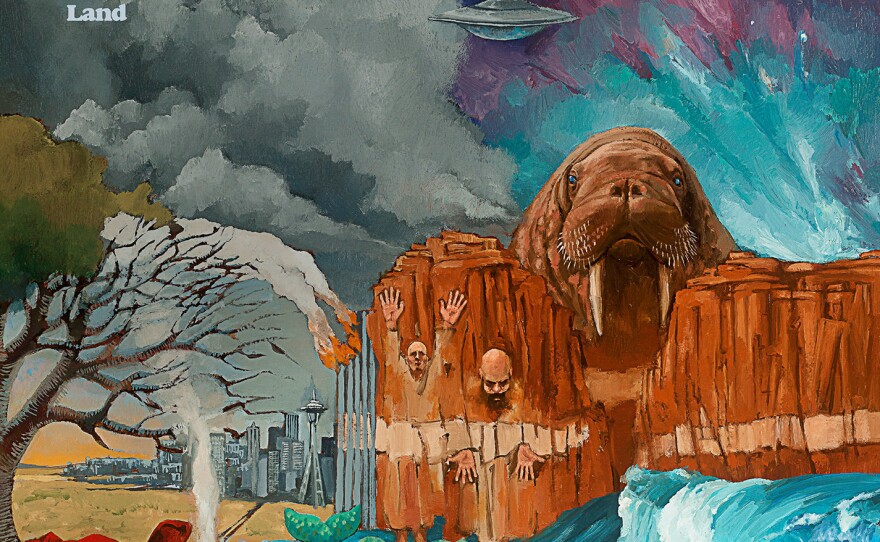Note: NPR's First Listen audio comes down after the album is released. However, you can still listen with the Spotify playlist at the bottom of the page.

"I went looking for a new direction / Indecisive, undecided," Damien Jurado sings in "Onalaska," one of the eeriest tracks on his new album, Visions Of Us On The Land. He's singing in character; there's nothing remotely indecisive or undecided about Visions. His direction, though, is indeed pretty new. The album is the final installment of a loose trilogy Jurado began with 2012's Maraqopa and continued on 2014's Brothers And Sisters Of The Eternal Son. This time around, he's delivered a sprawling, 17-song story arc that picks up where Brothers left off — that is to say, somewhere near the edge of terra incognita. After a car crash sends the trilogy's unnamed protagonist on some hazy kind of metaphysical odyssey, he's arrived at a state of existential bemusement, searching his psyche for answers. It's a heady concept, for sure, but one that Jurado anchors in gorgeous songwriting and lush, layered indie-folk arrangements.
That said, Visions isn't folky in a heart-on-the-sleeve kind of way. Jurado's no stranger to sad, sparse songs — he built his early career on them — but on Visions' "Sam And Davy," for instance, he forgoes the acoustic confessional in favor of something far grander. Not to mention bleak: With minor chords, booming bass-drum detonations and menacing flourishes of synth, Jurado yanks the wheel and forces a detour into the depths of psychedelic reverie, asking, "Does your blood run cold / Or your eyes go white / On a borrowed soul / And on borrowed time?" In "Prisms," Jurado channels one of his longtime heroes, Nick Drake; a more skeletal, guitar-plus-vocal track, it ponders the nature of memory as Jurado sings, "Do we still go on / Long after rewind?" His voice is so ghostly and echoing, it answers his own question.
Things don't exactly get upbeat from there — although "Exit 353," the first song he wrote for the album, has more of a left hook to it. A propulsive, chillingly lonely dirge spiked with a distorted, tooth-rattling guitar riff, it contains yet another unsettling question ("Are we all not lost in song?") whose response is self-evident. And in "A.M. A.M.," Jurado's singsong, reverb-cushioned melody is as plush as it is haunting. Richard Swift, an accomplished singer-songwriter in his own right, once again provides the assist as both producer and guest instrumentalist; his shadowy atmospherics stand out in "Mellow Blue Polka Dot," a cooing, catchy shuffle that recalls Bill Callahan's dark pop explorations.
Jurado has been playing the long game with his trilogy of albums, but the story arc doesn't come to a satisfying conclusion — nor should it. After the fingerpicked, Dylan-esque hush of "Orphans In The Key Of E," Jurado wraps up the album with a glance over the shoulder: "When I look back upon my time, see the snapshots of my life," he sings, "You will not be surprised to see your name across my smile." It's a small, welcome moment of sentimental peace, but it's fraught with its own ominous sense of loss as the refrain of "I will remember you / The way you are right now" begins to sound more like a fading distress signal than a comfort. As works of mood-altering music go, Jurado has upped the dosage with Visions. It's a harrowing trip, led by a guide who's all too familiar with the territory.
Copyright 2022 NPR. To see more, visit https://www.npr.org. 9(MDAzMjM2NDYzMDEyMzc1Njk5NjAxNzY3OQ001))





